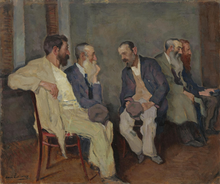Our website is made possible by displaying online advertisements to our visitors.
Please consider supporting us by disabling your ad blocker.
Speech community

A speech community is a group of people who share a set of linguistic norms and expectations regarding the use of language.[1] The concept is mostly associated with sociolinguistics and anthropological linguistics.
Exactly how to define speech community is debated in the literature. Definitions of speech community tend to involve varying degrees of emphasis on the following:
- Shared community membership
- Shared linguistic communication
A typical speech community can be a small town, but sociolinguists such as William Labov claim that a large metropolitan area, for example New York City, can also be considered one single speech community.
Early definitions have tended to see speech communities as bounded and localized groups of people who live together and come to share the same linguistic norms because they belong to the same local community. It has also been assumed that within a community a homogeneous set of norms should exist. These assumptions have been challenged by later scholarship that has demonstrated that individuals generally participate in various speech communities simultaneously and at different times in their lives. Speech communities have different norms, which they tend to share only partially. Communities may be delocalized and unbounded, rather than local, and often comprise different sub-communities with differing speech norms. With the recognition of the fact that speakers actively use language to construct and manipulate social identities by signalling membership in particular speech communities, the idea of the bounded speech community with homogeneous speech norms has become largely abandoned for a model based on the speech community as a fluid community of practice.
A speech community comes to share a specific set of norms for language use through living and interacting together, and speech communities may therefore emerge among all groups that interact frequently and share certain norms and ideologies. Such groups can be villages, countries, political or professional communities, communities with shared interests, hobbies, lifestyles, or even just groups of friends. Speech communities may share both particular sets of vocabulary and grammatical conventions, as well as speech styles and genres and norms for how and when to speak in particular ways.
- ^ Yule, G 2006, 'the study of language', third edition, Cambridge University press.
Previous Page Next Page


